
- -------PRE
ENGINEERING CONCEPTUAL DESIGN AND PROMOTION SERVICES--------
|
-
-
| CUSTOM DESIGNS - DIRECT CONTRACT SERVICES |
-
|
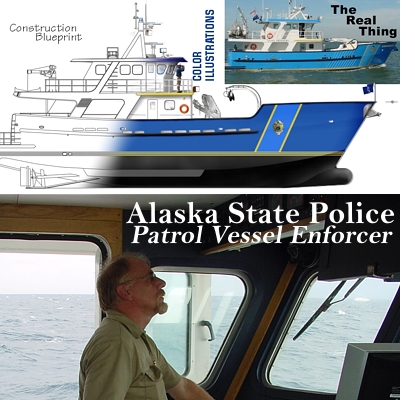 GA
Plans - Alaska State Police Patrol Vessel GA
Plans - Alaska State Police Patrol Vessel
In 1998 we might not have coined the phrase
"From Concept to Reality" but I sure lead the saying
ahead of a lot of other folks. In 2002 just before leaving for
a photo/video documentary acquisition in Mexico Chris Kennedy
was tending a proposal for the State of Alaska. He asked me to
rework a vessel design we had jointly developed and convert the
GA plans into a patrol boat. Based on my experience in the Coast
Guard I fashioned a number of features I would like to have seen
on our cutters. For example, a mess deck on the main deck where
you exited ready to tend the lines. After all, the mess deck
is also the coffee bar aboard any boat so why put it below deck.
Another is using the stylish webbing on
the side of the vessel as the vent chambers to exhaust heat out
of the engine room allowing it to warm the upper deck reducing
dangerous icing which contributes to instability as the center
of gravity is raised by the weight of frozen seawater on the
superstructure. A real problem while underway in Alaska during
the winter.
After developing the deck plans and GA
drawings I digitally painted a rendering and assembled a video
to market the design to the Alaska State Troopers. The result
of our efforts is the P/V Enforcer which is still underway serving
Ketchikan, Alaska.
|
-
- The design work for this 82' vessel started
out based on a 52 page specification book from the State of Alaska.
The criteria developed for this vessel was the work of dozens
of troopers providing input as to what they felt the boat should
be able to accomplish on a mission. Added to that, Chris Kennedy
and Rob Watson put their own special touches to the job at hand
based on experience and practical common sense. Click the image
(right) to see more.
|

|
 |
PowerPoint for Installation of Escalators
For Review and Action - Selecting this
icon will lead you to use your default process or application.
If you do not have Microsoft Power Point or compatible you can
go to Microsoft to download it here.
|
-
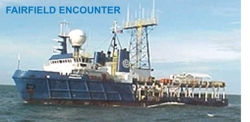 |
LASER SCANNING FOR SPONSON ADDON
You can see how rough the side of this
OSV is after years of abuse. When it came time to add sponsons
for an upgrade the concern was the it would be in drydock for
less than a month, return to sea, and them be back in 1 year
for the add-ons. During that time the engineer was to develop
the fit-up lines. I was commissioned to bring in a laser scanning
crew to the yard and arrange for the scan which would result
in a 3D CAD line drawing for the enginner to construct the sponsons
from.
|
-
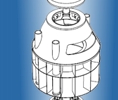 |
- 3D CAD FROM A 2D PROGRAM - YES IT CAN
- Quiet the argument that AutoCAD 2D can
not be used to create a 3D object. In the context of 3D I will
agree that AutoCAD is not a full 3D program. However, it can
generate 3D CAD as long as the objects do not use something like
a B-Spline Progressive Sweep. In other words, start as a small
radi and advance to a larger radi as it sweeps back over itself.
I think the best way to solve this is say that if it requires
a CNC machine to build it because it can not be made in a standard
mill, you can not build it accurately in AutoCAD.
|
-
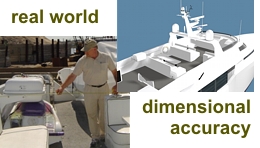 Whether
it's 2D or 3D design or digital painting or video animations,
we've proven over and again to be a valuable asset to individual
clients who haven't quite decided what they want and for those
who are not ready to dive into the engineering of their project. Whether
it's 2D or 3D design or digital painting or video animations,
we've proven over and again to be a valuable asset to individual
clients who haven't quite decided what they want and for those
who are not ready to dive into the engineering of their project.
-
- One important aspect of MarineImaging
is about being able to take a shortcut through the "study
plan" stage by constructing dimensionally accurate parts
and lofting them into an assembly to help clients visualize the
end result. To achieve our goals we offer
|
- OVERALL FLEXIBILITY
- FAST TURNAROUND
- PROPRIETARY AGREEMENTS
- DIMENSIONAL ACCURACY
|
- NATIVE AUTOCAD PRODUCTS
- REALISTIC VIEWS
- SITE SPECIFIC REPRESENTATION
- MULTIPLE OUTPUT OPTIONS
|
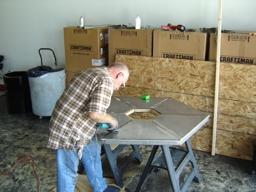 |
HIGH END HAIR SALON
These photos do not even do justice to
the hair salon fixtures and interior of the salon. Designed by
my daughter and 3D modeled and AutoCAD design by myself we put
together a 12 station styling center, Color Bar, Shampoo and
Pedicure, and a reception desk that could allow 4 people to work
uncrowded. All made with carbon and stainless steel and designed
so that only two people were needed to carry and assemble every
piece.
|
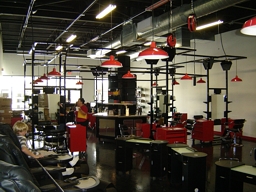 |
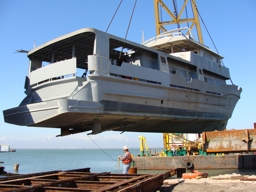 |
BAYCRAFT WHALE WATHCER CONVERSION
This 98ft Breaux Brothers Baycraft was
one of the first fast aluminum crew boats in the Gulf and one
of the best in its day. It was purchased by a private individual
and brought to Galveston for refitting. I was commissioned to
draft a new look in AutoCAD working with the owner. First, I
had to crawl from stem to stern and measure every detail because
there were not any drawings available. Another note was that
I included engine room exhausts into the webbing on the side
uprights. You can see the vents in this image. The swim platform
added room for 450 gallons of fuel ballast and the new engines
were expected to push the boat along on a 18 knot plane at cruise.
The reason it is being lifted is due to having been beached and
thrown over on its side during the hurricane.
|
-
-
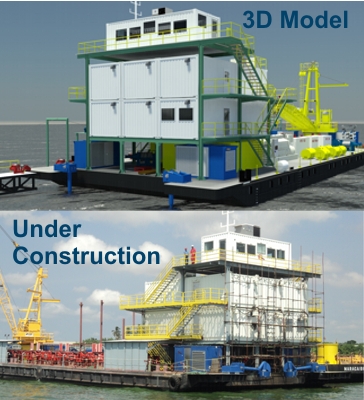 |
LAKE MARACAIBO, VENEZULA ACCOMMODATION
BARGE
During my employment with Thrustmaster
of Texas, Inc. in Houston I had the opportunity to work on some
very fast turnaround models in 3D MAX. Again emphasizing that
nearly ever model I develop comes from some form of AutoCAD drawing
or actual measurements I took.
This particular project is the best example
of developing a 3D model from 2D AutoCAD drawings. The actual
vessel, under construction and shown in this photo, was NOT even
a real barge when I made the 3D model. In fact, the 3D model
was used on brochures to promote the barge to Venezuela interests,
and then the barge was built using my models and their drawings
as the references.
The photo (left) was taken during construction.
As the model was developed place holders were used until the
actual product could be modeled. Mind you, I am developing this
model AND working on tradeshows and brochures all at the same
time.
|
-
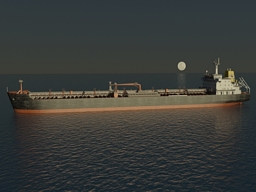 |
VESSEL SCENE COMPOSITIONS
What is wrong with this picture? The 3D
model of the ship is actually 350 feet long in the scene, which
is correct. The problem is one of the inherent problems with
3D modeling. To be so focused on the object that we forget the
lighting. We have a beautiful moon in the background, reflection
off the water is near perfect. The problem is illumination of
the tanker. The light cast onto the tanker from this side would
have to be huge to cover that much area. Much larger than reality
can allow. And as a result the tanker appears to be false because
it would have to be much smaller to be lit so.
|
-
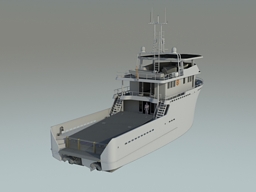 |
SHADOW STUDY
One thing I like so much about 3D Max is
that you can position your model and then set a day, date, and
time in order to see where the shadows will fall. In this case
the vessel was oriented by a compass rose to match the position
when moored at the owners dock. The time was set for the afternoon
at about 2:00 and rendered. Here you can see where the shadows
would be on the upper deck, and on the solar panels over head
of the open cockpit.
|
-
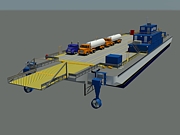 |
SPECIAL PURPOSE VESSELS
A river ferry in the Middle East has to
operate in severe flood and drought conditions, and especially
with heavy debris in the water. The premise behind my investment
in this design is not the ferry as much as it is the the hydraulic
lift thrusters which can be lifted to run with a more shallow
draft, tilted up to land on shore. The hydraulic podded motor
is less subject to damaging the prop if debris is ingested into
the nozzle. In this particular application the engines would
be water cooled and below deck leaving the upper deck for vehicles,
emergency gear, and passenger cabin space. In others, the engines
can be placed on deck and hydraulic lines ran to and from the
HPU power packs.
|
-
 |
BARGE WITH PROPULSION HAVING LIFT OPTIONS
Developed to carry cargo containers in
double stack this barge would need to enter shallow waterways.
The OD thruster with lift was the perfect solution.
|
-
 |
TACTICAL TRANSPORTER (TTS)
Developed to carry cargo containers up
the Tigress and Euphrates rivers to avoid dangerous roadways
the Tactial Transporter is SYSTEM, not a barge. Using Thrustmaster
hydraulic thrusters which can tilt and continue to operate through
shallow waters, these barges connect electronically through a
DP system. Once underway personel never need get out onto the
deck until they arrive at their destination.
|
-
 |
TRANSPORT CAPABLE RV BARGE (RVB)
Talk about your ultimate PARTY BARGE! This
RV Barge Concept was run through the U.S. Patent office only
to find that there were at least 7 similar patents so the project
originator decided to abandon the idea of delivering over three
hundred units to marina operators around the U.S.. Still, the
concept holds to OUR same idea of developing the model in AutoCAD
first, then producing renderings for promotional purposes.
|
-
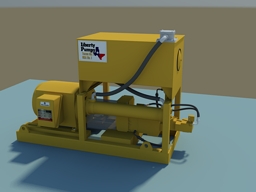
|
HYDRAULIC STEERING PUMP
- These steering pumps support 200hp electric
motors. While all of the details are not included on the pump
there are enough details to place the pump along side a thruster
unit to determine if it will fit into a room or on deck to serve
the steering solution.
|
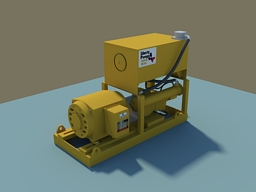 |
-
 |
ELECTRIC WINCH BRAKE
The electric winch brake is used in a deck
crane assembly (Examples page) to prevent free-falling cable
and hold for safety purposes. I was commissioned to create a
video of the crane which was still being prototyped. The video
was to run at the New Orleans Workboat Show. When the model was
complete I used it in a semi-transparency of the crane housing.
When I use the crane in a scene I no longer need the model and
will delete it out of the crane to require less data manipulation.
|
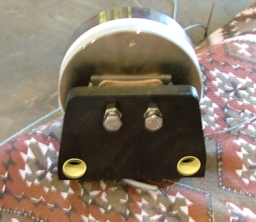 |
-
Devices
/ Equipment Developed by Charles R. Watson
(A few of these
I built or repaired in my home garage.)
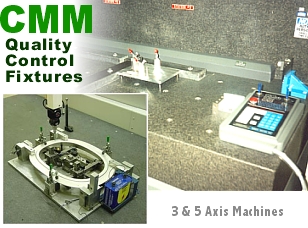
- CMM and Mechanical Measurement
Devices
|
|

- PLC Driven Pneumatic Logic Control
Box
|
|
-
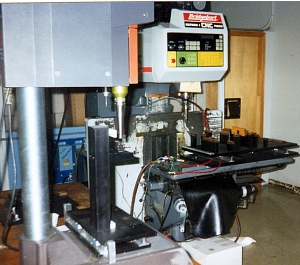
- Conversion of Discontinued CNC
Mill into CNC Heatstaking Tool For Medical Parts
|
|
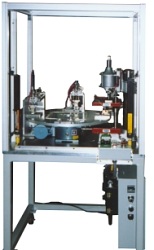
- 3 Station Pick & Place Dual
Heat Staking
- Iomega JAZ Internal
|
|
-
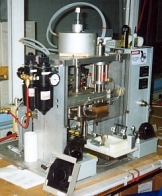
- Dual Position Heat Staking Single
Cycle - Digital Equipment Corporation Fan Assy.
|
|
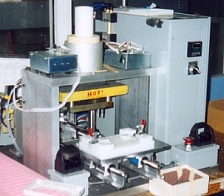
- P/C Board Heat Stake and Testing
- Digital Equipment Corporation Bezel Assy
|
|
-
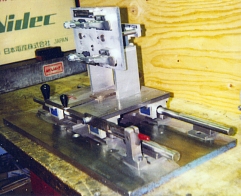
- Rotating Two Position Sonic Welding
Fixture - Digital Equipment Corporation
|
|
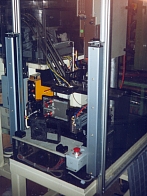
- Vibrator Bowl Feeder - Sonic Weld
With Light Screen - Digital Equipment Corp
|
|
-
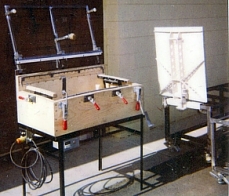
- Kitchen Sink Former - General
Electric Plastics R&D
|
|
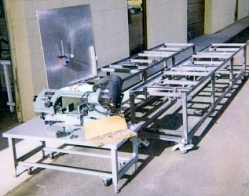
- Production Racks / Automatic Saw
/ Surface Ground Q/C Fixtures
|
|
-
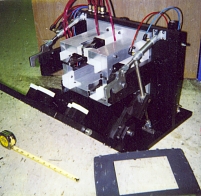
- 4-Position Gate Clipper
- Compaq Contura Bezel
|
|
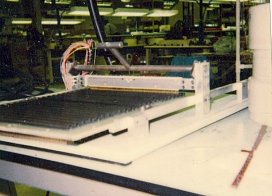
- HP 3069 PC Tester
- Prototype Pin Board Assembly Tester
|
|
-
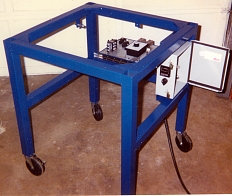
- Heat Staking Base With Pneumatic
Logic Controls & PID Temp Controller
|
|
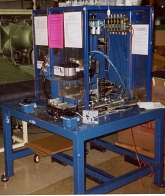
- Colorado Memory Systems
- Assembly Staking
|
|
-
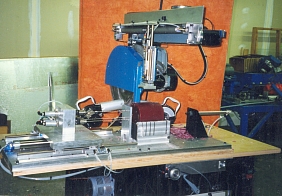
- Automatic Saw / 3x Drill Candles
- Wicks-N-Sticks (Pneumatic Logic)
|
|
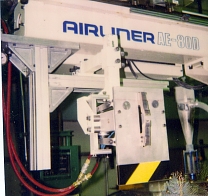
- Automatic Robotic Sprue Clippers
- Colorado Memory Systems
|
|
-
- © 1997-2016 c.r.
watson - all rights reserved
- The use of any trademarks,
trademarked names, and/or copyrighted information is stated as a fact of record and is not
- intended to imply endorsement
of any kind. The use of any pictures, writings, or materials
from this site without
- express written consent
of Charles R. Watson dba Watson Enterprises aka MarineImaging.com
is forbidden.
|
|